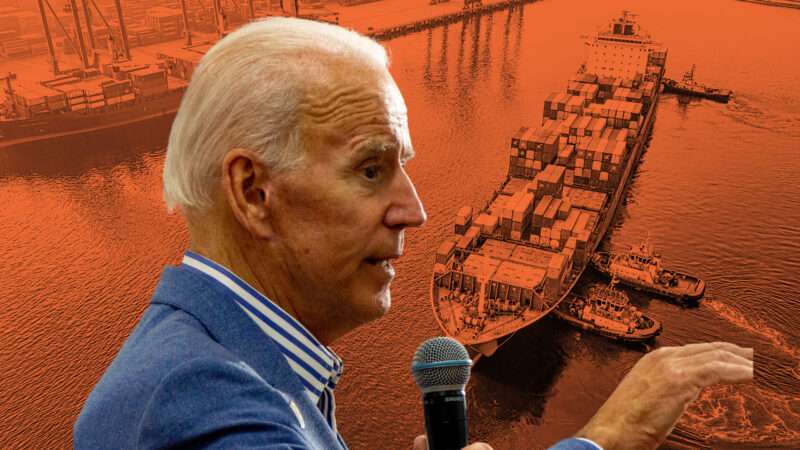
Last summer, amid clogged ports and skyrocketing international shipping rates, irate U.S. exporters called on Congress to act. The result was the Ocean Shipping Reform Act of 2022 (OSRA), passed with bipartisan support in Congress and signed into law by President Joe Biden on June 16. The law is ostensibly aimed at reforming U.S. shipping law to provide fair treatment for American exporters. Unfortunately, the bill creates a mess of a law that does little to address current domestic regulations that exacerbated problems in the supply chain caused by the pandemic, which have yet to fully abate.
Pandemic-related restrictions caused Americans to largely remain at home in 2021, increasing online shopping activities. But as restrictions began to ease later in the year, Americans also increased demand outside of the home, resulting in an overall increase in demand throughout the U.S. economy. This surge shocked the supply chain, and the ports of Los Angeles and Long Beach—the largest funnels of U.S. imports—saw some of the worst bottlenecks in U.S. history and revealed myriad systemic policy problems affecting coastal shipping, including restrictive labor, immigration, and trade policies.
As the supply chain fell into disarray, the market adjusted and prices increased, including shipping prices. These price increases were the result of simple economics, not price gouging by greedy shipping companies. Ocean carriers raised prices in response to high demand for goods with a limited supply of shipping as ships and containers were stuck in congested ports. Ocean carriers increased prices in an attempt to temper demand for shipping. As evidence that prices rose because of supply and demand, not greed, consider that shipping prices have recently fallen as supply chain woes have started to abate: Spot rates for 20-foot containers from Asia to the United States dropped almost 33 percent since peaking in September 2021.
Port congestion also increased the scarcity of containers, which contributed to a rise in carriers issuing detention and demurrage fees (which are essentially late fees charged when cargo isn't unloaded or containers are not returned in the contracted time frame). So, as stakeholders complained about carriers increasing prices and levying more fees, some policy makers claimed the ocean shipping sector lacked competition and should be investigated. After doing so, however, the Federal Maritime Commission (FMC) issued a report greatly at odds with the prevailing narrative: It actually found the market for ocean services is highly competitive.
Beyond being unfounded, concerns over limited competition and high ocean shipping rates from the OSRA champions are laughably hypocritical given their support for the Jones Act, a 1920 law that has restricted competition in domestic shipping to the point that industry executives have been able to engage in price fixing—a known anti-competitive practice. The OSRA, however, makes no attempt to open up the domestic shipping market to expanded competition.
The OSRA's gravest sin is that it buys into the mercantilist sentiment of prioritizing exports over imports. The bill prohibits "a common carrier, marine terminal operator, or ocean transportation intermediary" from retaliating against a shipper (the person or business that owns the products being transported) by "refusing, or threatening to refuse, an otherwise-available cargo space or accommodation; or resort to any other unfair or unjustly discriminatory action." The legislation requires the FMC to define "unfair or unjustly discriminatory action." But it may prove difficult to prove intent of retaliation, and businesses are (and should be) permitted to refuse service so ocean carriers should not be treated differently.
This provision stems from complaints made by U.S. exporters whose bookings were canceled during the pandemic. While understandably frustrating for U.S. shippers, these cancellations were due to the scarcity of containers and carriers choosing to return containers to Asia for reloading instead of sending them to export loading points in the U.S. The heightened demand for imports and scarcity of containers meant carriers were faced with the difficult decision of choosing between delaying imports or exports. The OSRA provision could simply force carriers to choose to delay imports if they are afraid of complaints from canceling bookings and not taking exports.
The law also increases regulatory oversight by granting the FMC authority to investigate complaints made about detention and demurrage fees and requires the commission to write rules on what carriers can and cannot do when assessing charges. Detention and demurrage fees provide important incentives to make sure cargo and containers are picked up and returned in a timely manner—thus, the devil will be in the details with the FMC's rule making.
Fortunately, a few useful provisions are included in the new law: expediting the process for worker credentials to transport cargo within the United States, identifying appropriate inland ports for overflow storage and transfer of containers during port congestion, and requiring the Government Accountability Office to submit a report to Congress describing the U.S. adoption of technology at ports compared to that of foreign ports. Such a report should illustrate the shocking reality of the lack of modernization of U.S. ports as compared to those in Europe and Asia, which are significantly more efficient and did not experience the extreme bottlenecks American ports did during the pandemic.
Unfortunately, the OSRA is a politician's syllogism: Lawmakers need to do something, the bill is something, and therefore, they must enact it. The frustrations felt by American exporters during the pandemic were understandable, but this law is likely to be ineffective at addressing shippers' qualms while likely making things worse for importers. Further, uncertainty remains as the FMC will be required to write rules to implement the law.
The OSRA may be a political win as Congress "did something"—likely the law's primary goal—but this law should not be mistaken for a serious attempt to improve the United States' ability to meet its shipping needs.
The post Congress and Biden Probably Just Made the Shipping Problem Worse appeared first on Reason.com.







